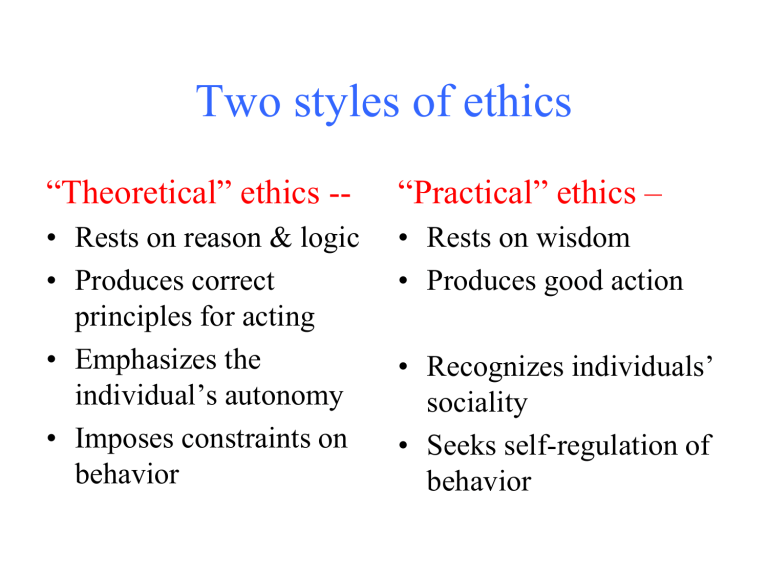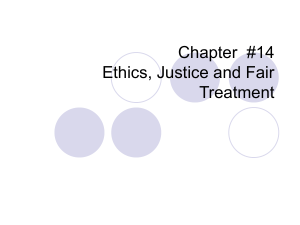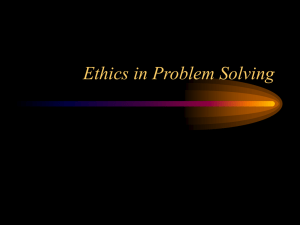Two styles of ethics

Two styles of ethics
“Theoretical” ethics --
• Rests on reason & logic
• Produces correct principles for acting
• Emphasizes the individual’s autonomy
• Imposes constraints on behavior
“Practical” ethics –
• Rests on wisdom
• Produces good action
• Recognizes individuals’ sociality
• Seeks self-regulation of behavior
“Theoretical” ethics
For example, Kant --
• Find correct maxims for behavior
• Accomplished by applying a logical test – the “rational” conceivability (reversibility and universalizability) of the maxim
• Done in “splendid” isolation
• Constrains us to act in ways we ordinarily might not, e.g., against our self-interest
“Theoretical” ethics
For example, Utilitarianism --
• Find correct action in a particular situation
• Accomplished by making a rational calculation – the best balance of benefits vs. costs (understood broadly to involve more than actual dollars)
• Done in “splendid” isolation
• Constrains us to act in ways we ordinarily might not, e.g., against our self-interest
Simple example
“Theoretical” ethics –
• Drive below posted maximum speed
• Drive above posted minimum speed, if any
• Observe variable speed zones
• Etc.
“Practical” ethics –
• “Drive at a speed reasonable and proper”
Less simple example
Old Testament Ethics
• Do the things on this list
• Don’t do the things on this other list
• Do what it says in that big stack of books
New Testament Ethics
• “Love the Lord your God with all your heart…soul…strength… and mind, and love your neighbor as yourself”
(Luke 10:27)
Aspects of “practical” ethics --
Community
• Our reality is essentially social – individuals exist only in communities, and communities themselves are built of other communities
• Our well-being is dependent on the wellbeing of the interlocking communities of which we are a part – including the businesses for which we work
Aspects of “practical” ethics --
Excellence
• Being “ethical” is acting “virtuously”
• Virtue (or being virtuous) is a matter of actively seeking excellence in our lived reality, rather than passively adhering to imposed standards
Aspects of “practical” ethics –
Role Identity
• Ethics is contextual, in the sense that at every moment and in every ethical decision we have multiple sets of roles and responsibilities within our intersecting communities
• Simple, absolute principles will always miss the ethical mark
Aspects of “practical” ethics --
Integrity
• The situational character of our ethical decisions means that different virtues will take precedence in different cases
• Integrity thus becomes the “linchpin” virtue
Aspects of “practical” ethics --
Judgment
• A mechanical application of simple rules will not work
• Broad judgment, wisdom, “moral imagination” is necessary
Aspects of “practical” ethics --
Holism
• Just as we must ethically integrate ourselves into our communities, we must integrate ourselves.
• Good character yielding “naturally” good behavior, rather than disjoint, piecemeal ethics
For example, Aristotle’s
“practical” ethics
• Virtues are a balance point between two extremes
– for example, courage lies between cowardice and foolhardiness
• The particular balance point depends on us and our individual situations, and our judgment enables us to determine what it is
• We ingrain a virtue and help make it “second nature” every time we act virtuously – for example, we become courageous by acting courageously
Being ethical Aristotle’s way
• Adopt the ideals for behavior that are embodied in the virtues – honesty, loyalty, courage, benevolence, civility, tolerance, wit, magnanimity, etc.
• Develop good character by practicing these virtues.
• Use the wisdom you have gained from this practice to “blend” the virtues appropriately for the differing situations of your life.
• Virtuous action will then flow from you as your second nature








